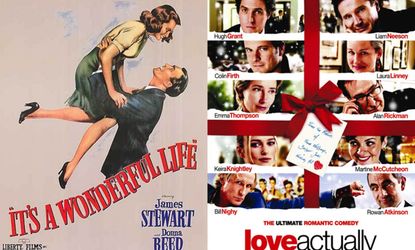7 enduring lessons from It's a Wonderful Life
Forget Love Actually. True wisdom lies in this Christmas classic.


If you're looking for proof of the decline of values, comparing two holiday movies — Love Actually and Frank Capra's timeless black-and-white classic It's a Wonderful Life — is illustrative.
The Atlantic's Christopher Orr recently penned an excellent takedown of the former, calling it the "least romantic film of all time." Among the pernicious lessons imparted, Orr says, is the notion "that love is overwhelmingly a product of physical attraction and requires virtually no verbal communication or intellectual/emotional affinity of any kind."
Fortunately, It's a Wonderful Life is still around. And in contrast to Love Actually, it's chock-full of terrific lessons, ranging from moral to financial to practical. Here are seven:
Subscribe to The Week
Escape your echo chamber. Get the facts behind the news, plus analysis from multiple perspectives.

Sign up for The Week's Free Newsletters
From our morning news briefing to a weekly Good News Newsletter, get the best of The Week delivered directly to your inbox.
From our morning news briefing to a weekly Good News Newsletter, get the best of The Week delivered directly to your inbox.
1. Your life has purpose
"Each man's life touches so many other lives, and when he isn't around he leaves an awful hole, doesn't he?" says the angel Clarence to George Bailey. One of the obvious points of the film is that, without George around, so many things would have been different. We learn that Bedford Falls, for example, would have been Pottersville. Of course, Zuzu and the other children would never have been born.
But the impact would have stretched far beyond this small town. "George saved his brother's life that day," says the angel Joseph, recalling when George's brother Harry fell through the ice of a frozen pond. Years later, Harry would become a war hero, saving the lives of others. The point is, we have no idea how significantly our lives affect others.
But that's only part of the reason to value your life. Aside from serving others, our lives should be viewed as a gift. As the angel Franklin notes, "At exactly 10:45 p.m. tonight, Earth time, that man will be seriously thinking of throwing away God's greatest gift."
2. Keeping up with the Joneses is for saps
This message is subtly sprinkled throughout the film. But the final example, writes Bob Welch in his book 52 Little Lessons from It's a Wonderful Life, comes when George's son announces that the neighbors have a new car. "Well, what's the matter with our car?" George snaps. "Isn't it good enough for you?"
George's ambition to be more than he is creates a lot of his problems, and is the cause of much restlessness and unhappiness. This is not to say that we shouldn't strive to better ourselves, but that maturity requires finding a balance. Learning to fully appreciate the blessings we have is a daily struggle for most of us, but most of today's pop culture only reinforces consumerism and naked ambition.
The question is, how are we defining our worth these days? It's a Wonderful Life leaves us with a clear message about that. "Dear George, remember no man is a failure who has friends. Thanks for the wings. Love, Clarence."
3. Bad guys don't always get punished
"In many movies, the final scene shows the bad guy being led away in handcuffs," writes Wes McAdams, a pastor from Texas. "It makes us feel good, knowing that justice has been served. Not so in It's A Wonderful Life." In fact, nothing bad happens to the villain.
"I love how George Bailey runs past Potter's window and yells, 'Merry Christmas, Mr. Potter!' and that's the last scene in which we see him," adds McAdams.
In an era when things tended to be resolved before the "The End" sign appeared on the screen, "It's a Wonderful Life deserves credit for not solving every problem with the tinkling of a bell," adds Mark Spearman.
Welch also notes that in the 1940s, "the Motion Picture Production Code definitely stipulated that criminals must be punished for their crimes," and the case has been made that Mr. Potter might have been guilty of larceny. During a Q&A in 1968, Welch recalls, Capra was asked about why Potter wasn't punished. "[O]ur main interest was what happened to George Bailey. This Lionel Barrymore (the actor who played Potter) character was too crusty, too old, too happy with what he was doing to change. So we just left him as he was."
It would have been easy to turn Potter into a sort of redeemed Ebenezer Scrooge who had seen the error of his ways. But in addition to avoiding a predictably sappy trope, Capra also reminded us that sometimes bad people get away with doing bad things.
4. Don't hire someone just because they are family
This is more of a practical maxim, but with all the touch-feely lessons in the film, it's important to cull some not-so-obvious and not-so-pleasant realities as well. "Uncle Billy, the brother of George's father, nearly ruined the business," recalls Julie Rains. "He drank on the job and didn't seem to be a productive employee even in the best of times. George could have hired a better employee or given him lesser responsibilities, somehow finding a way to show generosity in a way that didn't compromise the business."
5. Appreciate how blessed you already are
During his tirade, George tells Mary, "Everything's wrong!" But after his experience with Clarence, his whole perspective changes. This, explains Welch, is "because the stuff that does matter — family, friends, and faith — has now risen to such pre-eminence in his life that the rest doesn't really matter." Thus, he says things like, "Oh, look at this wonderful old drafty house, Mary! Mary!"
6. How to deliver a good toast
Okay, this one isn't so deep, but it is an important skill. In one scene, George and Mary deliver this toast to a new homeowner: "Bread, that this house may never know hunger. Salt, that life may always have flavor. And wine, that joy and prosperity may reign forever." So often we drone on during these moments. But simpler really is better (and often more eloquent). "It reflects a sentiment woven throughout the story, that things of true worth are not measured in dollars, but in the currency of friendship and family, and the good karma one puts out into the world," writes Mark Spearman.
7. Marry the right person
George's mother tells him that Mary is the "kind who will help you find your answers." She was right under his nose all along, of course. But once they do get married, she sticks with him through thick and thin.
Romance is merely one of the themes in this film — not the dominant theme as it is in Love Actually — and yet the romance between Mary and George is deeper and more palpable. I would argue this is because real romantic love transcends the superficial "love at first sight" baloney Hollywood is selling us. For more on that, see my post on why rom-coms are arguably worse than porn.
Sign up for Today's Best Articles in your inbox
A free daily email with the biggest news stories of the day – and the best features from TheWeek.com
Matt K. Lewis is a contributing editor at TheWeek.com and a senior contributor for The Daily Caller. He has written for outlets including GQ Politics, The Guardian, and Politico, and has been cited or quoted by outlets including New York Magazine, the Washington Post, and The New York Times. Matt co-hosts The DMZ on Bloggingheads.TV, and also hosts his own podcast. In 2011, Business Insider listed him as one of the 50 "Pundits You Need To Pay Attention To Between Now And The Election." And in 2012, the American Conservative Union honored Matt as their CPAC "Blogger of the Year." He currently lives in Alexandria, Va.
-
 Today's political cartoons - December 21, 2024
Today's political cartoons - December 21, 2024Cartoons Saturday's cartoons - losing it, pedal to the metal, and more
By The Week US Published
-
 Three fun, festive activities to make the magic happen this Christmas Day
Three fun, festive activities to make the magic happen this Christmas DayInspire your children to help set the table, stage a pantomime and write thank-you letters this Christmas!
By The Week Junior Published
-
 The best books of 2024 to give this Christmas
The best books of 2024 to give this ChristmasThe Week Recommends From Percival Everett to Rachel Clarke these are the critics' favourite books from 2024
By The Week UK Published